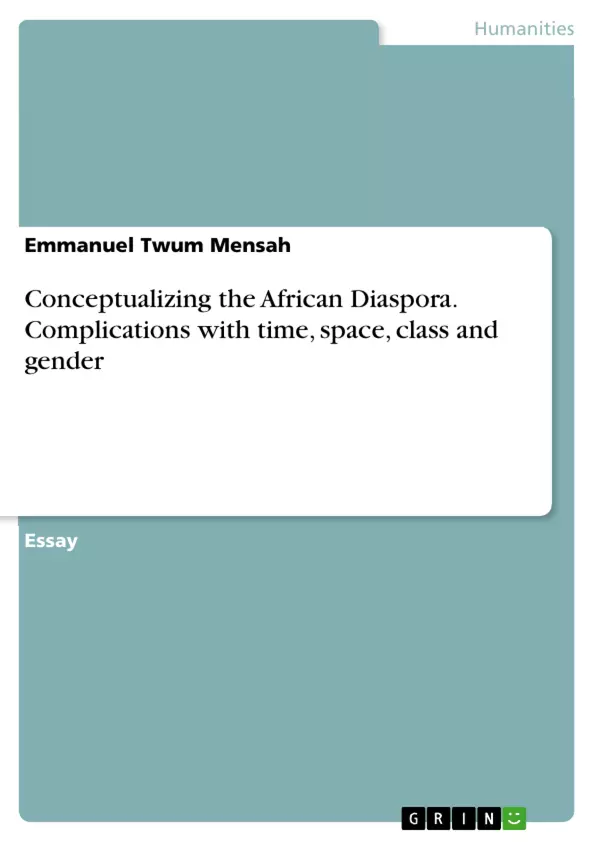The term “Diaspora” simply means a dispersion of a people, language or culture that was formerly concentrated in one place. But adding “Africa” to the term makes it complicated and difficult to define because of the way the African diaspora occurred and controversies among scholars in defining who an African is. This complexity raises questions such as is an African solely a black person, or is it someone who traces his descent to the continent and the ultimate question of whether Africans see themselves as one people or align themselves to their respective ethnic groups and to some extent their countries.
The complications is further heightened by how various authors conceptualize the African Diaspora. The Atlantic model which dominates the African Diaspora popularized by Paul Gilroy tries to shift focus and attention on the forced migration of West Africans from 16th Century to the 19th Century as slaves to the new world. Scholars such as Zeleza therefore argues that there is the need to “de-Atlanticize and de-Americanize the histories of African diasporas” and identifies three main sets of African Diaspora namely the trans-Indian Ocean diasporas, trans-Mediterranean diasporas, and trans-Atlantic diasporas.
These sets of African Diaspora have their own histories and their differences and similarities between them making it more difficult to conceptualize the African Diaspora as referring to one event. This essay therefore seeks to explain how the complications in conceptualizing the African Diaspora stretches across time, space, class and gender.
Inhaltsverzeichnis (Table of Contents)
- Conceptualizing the African Diaspora: Complications with time, space, class and gender
- Complications with time
- Spatial Complications
- Class Complications
- Gender Complications
Zielsetzung und Themenschwerpunkte (Objectives and Key Themes)
This essay aims to explore the complexities surrounding the conceptualization of the African Diaspora, highlighting how these complications extend across various dimensions such as time, space, class, and gender. This exploration seeks to understand how different experiences and perspectives contribute to the diverse nature of the African Diaspora.
- The challenges of defining the African Diaspora due to its diverse origins, historical periods, and geographical locations.
- The impact of various models, such as the Atlantic model, on understanding the African Diaspora.
- The significance of considering class and gender dynamics within the African Diaspora.
- The implications of different assimilation policies and experiences for the African Diaspora across various regions.
- The need to recognize the diversity and nuances within the African Diaspora, emphasizing the importance of studying individual diasporas independently while acknowledging their interconnectedness.
Zusammenfassung der Kapitel (Chapter Summaries)
The essay begins by examining the complications related to the periodization of the African Diaspora, highlighting the difficulties in establishing a definitive starting point due to the existence of both pre-modern and modern diasporas. The text then explores the spatial complications, emphasizing the challenges in defining "Africa" and "African" due to the diverse nationalities within the continent and the different experiences of Africans in the diaspora.
The essay subsequently delves into the complexities of class relations in African Diaspora studies, acknowledging the diverse experiences of Africans based on their historical circumstances and socioeconomic conditions. Finally, the text addresses the challenges of understanding gender roles in the African Diaspora, highlighting the lack of research and the varying experiences of African women across different regions.
Schlüsselwörter (Keywords)
The essay focuses on key concepts such as the African Diaspora, Atlantic model, de-Atlanticization, de-Americanization, pre-modern diaspora, modern diaspora, spatial complications, class complications, gender complications, assimilation policies, and diasporic consciousness. These terms are central to understanding the diverse experiences and challenges surrounding the African Diaspora.
Frequently Asked Questions
What is the basic definition of the African Diaspora?
It refers to the dispersion of people, languages, and cultures of African origin across the world, formerly concentrated on the African continent.
Why is the "Atlantic model" criticized by some scholars?
Critics like Zeleza argue it overemphasizes the forced migration of West Africans to the Americas, neglecting other significant diasporas like the trans-Indian Ocean and trans-Mediterranean movements.
What are the spatial complications in defining the African Diaspora?
Complications arise from the diversity of nationalities and ethnicities within Africa, making it difficult to define a singular "African" identity for everyone in the diaspora.
How does gender play a role in diaspora studies?
Gender dynamics are often under-researched, yet they are crucial as women experience migration, assimilation, and cultural preservation differently across various global regions.
What is meant by "diasporic consciousness"?
It is the sense of belonging and connection that individuals in the diaspora feel toward their ancestral homeland and other members of the same diaspora, despite being geographically separated.
- Quote paper
- Emmanuel Twum Mensah (Author), 2017, Conceptualizing the African Diaspora. Complications with time, space, class and gender, Munich, GRIN Verlag, https://www.grin.com/document/354629



